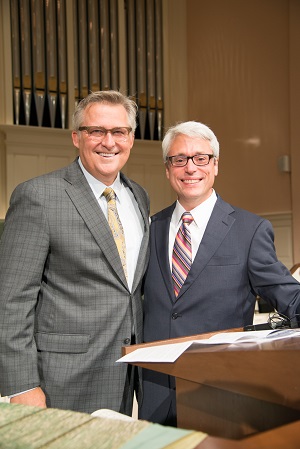By Bob Allen
A prominent Cooperative Baptist Fellowship Church in Texas marked its pastor’s 25th anniversary Aug. 24 by renaming a model pastoral residency program in his honor.
 A weekend-long celebration at Wilshire Baptist Church in Dallas culminated with a Sunday morning announcement of the George A. Mason Pathways Endowment. The fund, currently totaling just over $3 million, is aimed at ensuring that a program launched in 2002 with a grant from the Lilly Endowment will continue after the grant money phases out.
A weekend-long celebration at Wilshire Baptist Church in Dallas culminated with a Sunday morning announcement of the George A. Mason Pathways Endowment. The fund, currently totaling just over $3 million, is aimed at ensuring that a program launched in 2002 with a grant from the Lilly Endowment will continue after the grant money phases out.
“This is really touching to me, as you might imagine,” Mason responded to the surprise announcement. “This represents something that I think is part of what I hope will be your legacy as well as mine, as our work and ministry lives on in the lives of young ministers all over the country. Some of them are here in this room, and they carry you everywhere they go in their hearts, as we carry them.”
Mason’s own testimony includes being challenged by his pastor to consider his calling to the ministry as he dreamed of being an NFL quarterback during his sophomore year playing football at the University of Miami. He went on to earn both the master of divinity (1982) and doctor of philosophy (1987) degrees from Southwestern Baptist Theological Seminary in Fort Worth, Texas.
Still, Mason was viewed by some as being “a bit wet behind the ears” when he was asked to fill the shoes of his predecessor, Bruce McIver, who retired after 30 years as pastor of Wilshire in 1988.
James Perry, chairman of Wilshire’s personnel committee, told the congregation some on the pastoral search committee had qualms about calling a 32-year-old as pastor. “In fact, I’m told one member of the committee referred to him as Boy George,” Perry said. “It was the 1980s, don’t you know.”
Perry said, as often is the case, nobody expected the individual selected to follow someone who had been pastor for 30 years of the church’s 50-year history would be around for long. Instead of being a death sentence for a young pastor, however, McIver took Mason under his wing, acting as his mentor.
Shortly before McIver’s death in 2001, the two men discussed during a hospital visit developing a model for others to replicate what they had learned together. Their idea was to create a two-year mentoring program giving young ministers on-the-job training in a large church setting before striking out on their own, similar to internships in other fields like medicine.
About that time the Indianapolis-based Lilly Endowment — one of the world’s largest philanthropic foundations started by the founders of the pharmaceutical company Eli Lilly and Company — began supporting a small number of pilot projects aimed at assisting new pastors in making the critical transition from seminary student to full-time pastor as part of a larger program to help congregations adapt to a changing ministry landscape.
Wilshire became one of the few Baptist congregations to receive a grant from Lilly’s Transition-into-Ministry program, establishing a pastoral-residency program within an initial grant of $800,000.
Beginning with a first pastoral resident in 2004, the church now provides service opportunities for four recent seminary or divinity school graduates in sets of two in a two-year rotation. Today, nearly two dozen alumni of the program serve in a variety of ministry roles across the country.
In a video greeting to a Saturday night banquet for the Pathways Endowment, Cooperative Baptist Fellowship Executive Coordinator Suzii Paynter described the residency program as “a laboratory for ministry that’s developed so many gifts in so many leaders.” Through its success, she said, Wilshire is recognized as “a major teaching church in our country.”
While serving as pastor at Wilshire, Mason has been active in leadership in organizations including the CBF, Baptist General Convention of Texas, Texas Baptists Committed, Brite Divinity School at Texas Christian University, Duke University Divinity School, the Lilly Endowment and the Alban Institute.
Mason chaired the search committee that recommended Paynter’s election last year as the third CBF executive coordinator, and the first woman to lead the 1,800-church network formed in 1991.
While McIver was active in the Southern Baptist Convention — including his unsuccessful nomination in 1984 to challenge Houston judge Paul Pressler for a seat on the SBC Executive Committee — Wilshire ended its 50-year relationship with the denomination in 2000.
Mason said at the time it was a difficult decision, “but our church had been, for the last 10 years, so closely identified with the Cooperative Baptist Fellowship that we came to know who we are, and that helped us know who we are not.”
